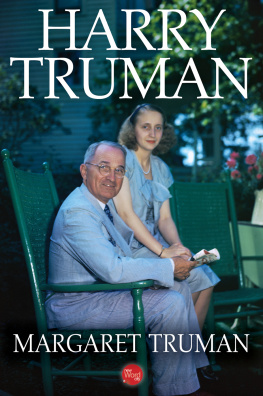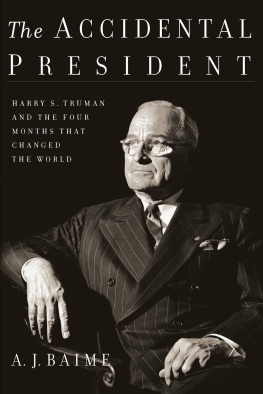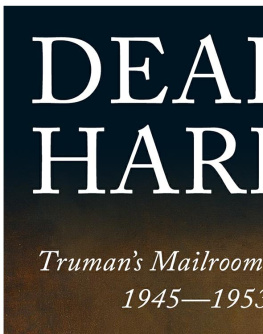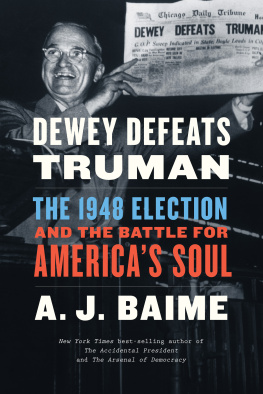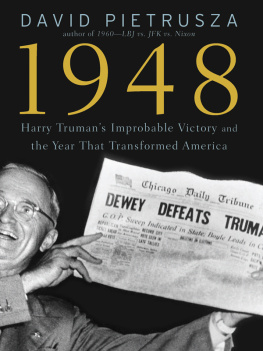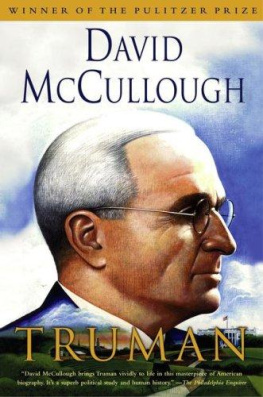Copyright 2020 by Albert Baime
All rights reserved
For information about permission to reproduce selections from this book, write to or to Permissions, Houghton Mifflin Harcourt Publishing Company, 3 Park Avenue, 19th Floor, New York, New York 10016.
hmhbooks.com
Library of Congress Cataloging-in-Publication Data
Names: Baime, A. J. (Albert J.), author.
Title: Dewey defeats Truman : the 1948 election and the battle for Americas soul / A.J. Baime.
Other titles: 1948 election and the battle for Americas soul
Description: Boston : Houghton Mifflin Harcourt, 2020. | Includes bibliographical references and index.
Identifiers: LCCN 2019042905 (print) | LCCN 2019042906 (ebook) | ISBN 9781328585066 (hardcover) | ISBN 9781328588593 (ebook)
Subjects: LCSH: PresidentsUnited StatesElection1948. | United StatesPolitics and government19451953. | Truman, Harry S., 18841972. | Dewey, Thomas E. (Thomas Edmund), 19021971. | Wallace, Henry A. (Henry Agard), 18881965. | Thurmond, Strom, 19022003.
Classification: LCC E815 .B35 2020 (print) | LCC E815 (ebook) | DDC 324.973/0904dc23
LC record available at https://lccn.loc.gov/2019042905
LC ebook record available at https://lccn.loc.gov/2019042906
Cover design by Brian Moore
Cover photographs: W. Eugene Smith / The Life PictureCollection via Getty Images
Author photograph Derek Joseph Giovanni
v1.0620
Every vital question of state will be merged in the question, Who will be the next President?
Alexander Hamilton
It is not just a battle between two parties. It is a fight for the very soul of the American government.
Harry Truman, Chicago Stadium, October 25, 1948
Introduction
A GROUNDSWELL OF WHITE NATIONALISM. Impeachment headlines. A president caught in a bitter public feud with his own Congress. A resurgence of populism. A game-changing new form of media. A chief executive aiming fake news accusations at the national press. War and terrorism in the Middle East. A booming economy, with historically low unemployment. The FBI on the trail of a major presidential candidate regarding a possible Russian conspiracy.
The year was 1948.
This book is about the first postwar presidential election, which was the first election to play out on the television machine and was the most shocking electoral upset in the history of the United States, at least up until 2016. In the years after 1948, it was commonly said that all Americans could remember exactly where they were on two occasions: when they heard the news of the Japanese attack on Pearl Harbor and when they learned the result of the 1948 presidential election. Harry S. Trumans campaign was called at the time the most colorful and astonishing political campaign in modern American history, a gigantic comedy, the wildest campaign of the century.
The impetus for this book is another I wrote, The Accidental President, published in 2017; it covers the first four months of Trumans presidency, when an obscure vice president with relatively little formal education found himself suddenly in charge of a world war following the death of Franklin Roosevelt. (Readers who consumed that book may want to skim chapter three in this one, which covers Trumans history and thus some familiar details.) While researching that book, I realized that the challenges of peacetime, in the wake of a global conflict and the birth of the atomic age, could be equally staggering. In the run-up to his longshot bid to be elected in his own right, Truman faced the founding of Israel and the start of the 1948 Arab-Israeli War. He desegregated the military. He launched the Marshall Plan and the Berlin Airlift. The explosive Alger Hiss espionage charges set off the Red Scare.
The year 1948 saw a brutal and at times deadly struggle in which black southerners sought to exercise their right to vote. It witnessed the beginning of a historic realignment of the Democratic Solid South, which transformed states like Alabama, Mississippi, South Carolina, and Georgia into the Republican strongholds they remain today.
Documents of the time express startling fear on both sides of the aisle that Moscow would attempt to meddle in the American election. One campaign official wrote in a secret memo in 1947 that the Kremlin will sponsor political disturbances everywhere it can throughout the next twelve months... It will try to influence the result of the 1948 election by every means conceivable.
The Operation Sandstone atomic-bomb tests, anxiety that World War III could break out at any momentall of this formed the stage upon which the election campaigns unfolded. The shifts in the tides of power moved with ruthless force, creating the geopolitical world of the future, our world of today.
Dewey Defeats Truman will bring readers inside the situation rooms of four campaigns: Harry Trumans Democratic Party, Thomas Deweys Republican Party, Henry Wallaces breakaway Progressive Party (which was largely controlled by a secret cell of Communists), and Strom Thurmonds States Rights Democratic Party (the Dixiecrats, a campaign of unapologetic white supremacy). While the elections victor is the ultimate focus of the book, my goal was not to favor one candidates policies over another, but rather to state the facts and how they were perceived at the time. Although two of these candidates performed poorly in the end, their stories in retrospect are extraordinary. Oftentimes we can learn as much from election losers and charismatic political misfits as we can from the winners.
I have tried as often as possible to let original documentation unfold this narrativeto allow these historical characters to bring themselves to life through their own memorandums, diaries, and oral histories. The expectation I set for myself was this: If they could read this book today, they would find it fair, factual, and expressive of the almost desperate urgency that fueled their quests for the presidency. As the New York Times put it just before Election Day in 1948: The fate of the nation and of civilization is at stake.
Truman believed that history repeats itself. The history of the world, he wrote, has moved in cycles and... very often we find ourselves in the midst of political circumstances which appear to be new but which might have existed in almost identical form at various times during the past six thousand years. My guess is that readers will find the election season of 1948 uncannily relevant today.
At the same time, I am hoping readers will find inspiration in this book. During 194748, the bipartisan discourse was mercilessly vitriolicas it is today. Yet when faced with a national emergency, Democrats and Republicans came together to launch some of the most enduring policies in the countrys history (the Truman Doctrine, the Marshall Plan). These leaders realized that their duty as public servants was not to their parties but to all Americans, in the vital struggle for the future.
A. J. BAIME
OCTOBER 30, 2019
Part I
The Disintegration of the Democratic Party
The loud outcry against President Truman exceeds anything we have heard in a long time. There is about it a savage quality.
Washington Post, October 11, 1946
1
Whither Harry S. Truman?
ALL IN, A SECRET SERVICE man said.
It was 7 p.m. on August 14, 1945. A White House usher closed the door to the Oval Office and Harry Truman stood from behind his desk, staring out at a crowd of some two hundred perspiring radio and newspaper reporters who had just pushed their way in. Klieg lights from newsreel cameras glared off the presidents wire-rim spectacles. A row of cabinet officials stood behind him, and at the edge of the room, the First Lady, Bess Truman, was seated on a couch, her hands folded in a ball on her lap. Truman held up a statement in his right hand and began to read. All in the room knew what this address would communicate, but still, the words had the effect of an electric shock.



